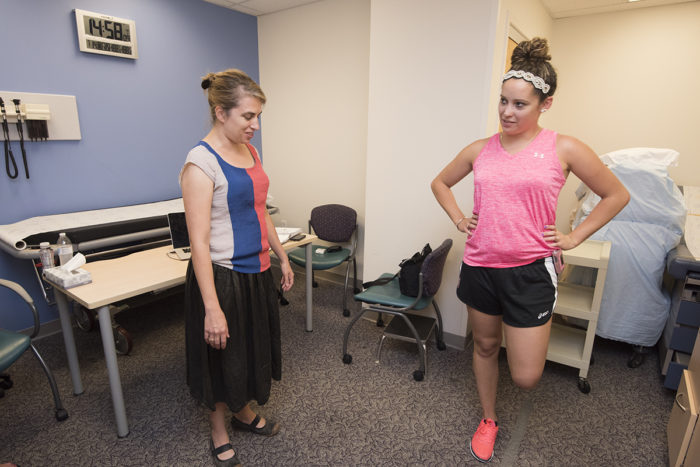$3 million to help expand Wolfram syndrome research
Grant to renew annual clinic, advance understanding of rare disorder
 Washington University
Washington UniversityNeurologist Amy Viehoever, MD, tests the balance and coordination of patient Caitlin Fess during a clinic for Wolfram syndrome patients. Balance and gait are often abnormal in patients with the syndrome.
Researchers at Washington University School of Medicine in St. Louis have received a five-year, $3 million grant to study Wolfram syndrome, a rare genetic disorder that causes neurologic problems, insulin-dependent diabetes and other serious conditions.
The new grant, from the Eunice Kennedy Shriver National Institute of Child Health & Human Development of the National Institutes of Health (NIH), will help fund the continuation of a Wolfram clinic at Washington University for patients from around North America and the world. It also will allow Washington University investigators to strengthen their ties to researchers in the United Kingdom who have launched a clinical trial evaluating a potential treatment for the disorder.
Wolfram syndrome, which affects about one in every 500,000 people, is caused by mutations in a single gene. The disorder has been regarded mainly as a very severe form of type 1 diabetes, with hearing loss, vision loss and neurologic problems developing as the disease advances. Wolfram syndrome patients are at risk for a limited lifespan, often due to complications related to brain degeneration.
By following young children and adolescents for several years since the launch of the Wolfram clinic — conducted during the summer at Mallinckrodt Institute of Radiology (MIR) at the School of Medicine, and St. Louis Children’s Hospital — the researchers have learned that some of the neurologic problems associated with Wolfram syndrome begin very early and that some patients don’t develop diabetes until much later in the course of the illness.
“From our brain-imaging studies, it appears Wolfram syndrome fits into a category of disorders called hypo-myelinating developmental diseases,” said the study’s principal investigator, Tamara G. Hershey, PhD, the James S. McDonnell Professor of Cognitive Neuroscience and a professor of psychiatry and of radiology at the School of Medicine. “The pattern we see suggests that in certain key areas, the brain doesn’t make enough of a substance called myelin, which insulates axons that carry signals to and from nerve cells. This deficit in insulation may leave cells vulnerable to dysfunction and degeneration over time.”
Although insulin-dependent diabetes almost always is a component of Wolfram syndrome, Hershey said her research involving the Wolfram clinic suggests it may be easier to identify some of the earliest signs of the syndrome with neurologic testing.

“The neurologic symptoms appear early,” said Hershey, who also is chief of the Neuroimaging Laboratory at MIR. “Sensory functions — such as smell, balance and gait — all are abnormal at a really early stage of the game. In addition, using brain scans we can detect structural effects in the brain very early and follow them over time.”
In funding the clinic and strengthening ties to researchers in the United Kingdom, Hershey said the new grant will help researchers learn how the disorder develops and progresses in most patients.
“There is thought to be a classic set of symptoms, but actually not everybody has them,” she said. “There are many different mutations in the Wolfram gene, and unless we combine data across a large number of patients, we can’t understand how this genetic variation predicts the type and rate of change of symptoms over time that individuals experience. Our goal is to move forward, linking symptoms to various mutations in the gene and linking those findings to imaging data to understand the underlying neurobiology.”
Learning more about what causes symptoms in a rare disease such as Wolfram syndrome also might help researchers better understand more common disorders, such as type 1 diabetes, neurodegenerative conditions and multiple sclerosis.
The WSF-1 gene linked to Wolfram syndrome first was identified in 1998 by M. Alan Permutt, MD, a former faculty member at the School of Medicine. He later developed an animal model of the disorder and set up an international patient registry.
In 2010, the university organized the world’s first multidisciplinary clinic for patients with Wolfram syndrome, funded in part by MIR and the Snow Foundation, an organization dedicated to raising funds for Wolfram syndrome research. Children worldwide now come to St. Louis for annual testing and evaluation.






